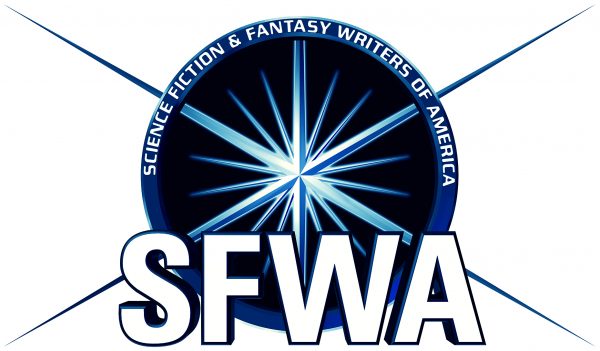For our topic today, we have a guest post from QSFer Tali Spencer:
When I joined SFWA 30 years ago…
No, that’s not a typo. I really am that old. I joined Science Fiction Writers of America after I published my first novel in 1985. So I’ll just put that out there. I let my membership drop at one point when I’d stopped publishing for a while, but then picked it up again in 2002 after George R.R. Martin told me and a friend we would be short-changing ourselves if we didn’t. By then the organization had changed its name to Science Fiction and Fantasy Writers of America. I and lots of other people now want them to change the America part to Association, to reflect how global our genre truly is.
From the beginning, I’ve liked feeling part of the bigger science fiction community. Of course every group has its loudmouths and troublemakers, but for the most part folk in our genre are pretty amazing and a damn lot of fun. I’ve been around long enough to have seen the organization through upheavals, kerfuffles, and growing pains.
I think every author of science fiction and fantasy should, if at all possible, belong to SFWA. Why? For one thing, the group advocates for writers. Only for writers. SFWA wants all writers of spec fiction to be paid for their work, receive fair contracts, not be exploited by publishers, agents, or other entities, and to have good information about everything from the fine points of contracts to which publishers are screwing over their authors. Here are a few of the resources SFWA supports:
Grievance Committee (aka Griefcom)
Note that the Grievance Committee, Contracts Committee, and Emergency Medical Fund are for members only. Writer Beware is a public resource and an absolute life-saver for authors. For Writer Beware alone, I would belong to SFWA. Those other committees… I’ve never used them. Other writers have, though. They’ve needed them. Through SFWA, many authors of spec fiction have gotten justice, or help for medical emergencies, they could not have gotten otherwise.
A lot of writers think the organization is elitist because it has membership requirements they don’t meet. I’ll be the first to agree SFWA’s standards haven’t always been in step with the times. When ebooks hit the scene and self-publishing became a realistic way for authors to earn an income, SFWA continued to insist that qualifying novels be published by traditional publishers who offered the kind of advances smaller digital publishers did not, and which self-published authors of course had no chance at all of ever seeing. [No, it does not count if authors pay the advance to themselves.]
Those membership guidelines needed an overhaul. Thanks to lots of hard work by SFWA members who believed digital publishing deserved an in, the matter finally came to vote—and members passed the new guidelines.
Since last year, SFWA accepts digital press and self-published work as qualifying for membership, if it meets the standard for length and paid sales. For example, an indie novel that was self-published, or published through, say, Dreamspinner, must earn $3,000 over the course of one year. If the author can provide proof of earnings, they qualify.
SFWA wants more indie authors as members. There’s an Old Guard, to be sure, but who will be the New Guard? I think it will be people like us: writers passionate about science fiction and fantasy but who for our own reasons are publishing our own work, or have made a place for our brand of fiction in digital publishing. There’s a place for us in an organization that has such a formidable footprint in our genre.
But that’s not all! Look at these other membership benefits…
SFWA members vote in the Nebula Awards for the year’s best science fiction and fantasy.
SFWA membership list—it’s fun having your name share a list with George R.R. Martin.
SFWA suites at conventions are great for networking. You can bring in non-member guests, too. And they have cake. And coffee.
The prestige of being a SFWA member when writing query letters to publishers and agents. Trust me, they notice. We even come in handy sometimes, like when Dreamspinner applied to become an Affiliate Member this past year, and SFWA asked them to supply references from SFWA members.
How many did they come up with? Three…two of whom are members of this group.
Belonging to SFWA is an investment. It’s an investment in your career, but more importantly it’s an investment in the direction and future of science fiction and fantasy as a genre. Informing, voting in, and supporting SFWA is a way to help us all succeed.
And we have cake.



